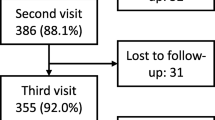Abstract
The objective of this study was to evaluate the feasibility, reliability, validity and responsiveness of the HIV Overview of Problems Evaluation System (HOPES) in a Dutch sample. The HOPES was administered three times in a one-year period to a sample of 106 outpatients with a symptomatic HIV-infection (n=23) or AIDS (n=83). The HOPES is a self-report HIV-specific quality of life (QOL) questionnaire including five scales: physical, psychosocial and sexual functioning, medical interaction and partner relationship. QOL was also assessed with the EORTC Quality of Life Questionnaire (EORTC QLQ-C30), a 30-item self-report instrument. Clinical data included Centers for Disease Control and Prevention (CDC) stage, date of diagnosis and CD4 cell count. Patients needed approximately 20–30 minutes to complete the questionnaire. The five scales had good internal consistency reliability. Multitrait scaling analysis provided moderate support for item discriminant and convergent validity. The HOPES exhibited adequate levels of construct validity: (1) the inter-scale correlations and correlations with the EORTC QLQ-C30 were in the predicted direction; (2) it discriminated clearly between patients with AIDS and ARC and (3) it was able to document changes in QOL over time. Moreover, the HOPES was responsive to changes in clinical status over time as indicated by CD4 counts. This study provides further evidence of the reliability and validity of the HOPES and shows that this instrument is responsive to changes in CD4 cell counts.
Similar content being viewed by others
References
Ganz PA, Coscarelli Schag CA, Kahn B, Petersen L, Hirji K. Describing the health-related quality of life impact of HIV infection: Findings from a study using the HIV Overview of Problems Evaluation System (HOPES). Qual Life Res 1993; 2: 109–119.
Schag CAC, Ganz PA, Kahn B, Petersen L. Assessing the needs and quality of life of patients with HIV Infection: development of the HIV Overview of Problems Evaluation System (HOPES). Qual Life Res 1992; 1: 397–413.
Stewart AL, Hays RD, Ware JE. The MOS short-form general health survey: reliability and validity in a patient population. Med Care 1988; 26: 724–735.
Wu AW, Rubin HR, Mathews WC, et al. A Health Status Questionnaire using 30 items from the Medical Outcomes Study; a preliminary validation in persons with early HIV Infection. Med Care 1991; 29: 786–798.
McNair DM, Lorr M, Droppelman LF. Manual for the Profile of Mood States. San Diego: Educational and Industrial Testing Service, 1981.
Rahe RH. Epidemiological studies of life change and illness. Int J Psychiatry Med 1975; 6: 133–146.
Bloom JR, Gorsky RD, Fobair P, et al. Physical performance at work and at leisure: validation of a measure of biological energy in survivors of Hodgkin's disease. J Psychosoc Oncol 1990; 8: 49–63.
Frissen PHJ, van der Ende ME, Ten Napel CH, et al. Zidovudine and Interferon-alpha combination therapy vs. zidovudine monotherapy in subjects with symptomatic human immunodeficiency virus type I infection. J Infect Dis 1994; 169: 1351–1355.
Karnofsky DA, Abelman WH, Craver LF, Burcheneal JH. The use of nitrogen mustards in the palliative treatment of carcinoma. Cancer 1948; 1: 634–656.
Aaronson NK, Ahmedzai S, Bergman B, et al. The EORTC QLQ-C30: a quality of life instrument for use in international clinical trials in oncology. J Natl Cancer Inst 1993; 85: 365–376.
De Boer JB, Sprangers MAG, Aaronson NK, Lange JMA, van Dam FSAM. The feasibility, reliability and validity of the EORTC QLQ-C30 in assessing the quality of life of patients with a symptomatic HIV infection or AIDS (CDC IV). Psych Health 1994; 9: 65–77.
Hays RD, Hayashi T, Carson S, Ware JE. User's guide for the Multitrait Analysis Program (MAP). Santa Monica, CA: Rand Corporation, 1988.
Nunnally JC. Psychometric theory, 2nd ed. New York: McGraw-Hill, 1978.
King MB. Psychosocial status of 192 outpatients with HIV infection and AIDS. Br J Psychiatry 1989; 154: 237–242.
Lubeck DP, Fries JF. Changes in quality of life among persons with HIV infection. Qual Life Res 1992; 1: 359–366.
Lubeck DP, Fries JF. Health status among persons infected with human immunodeficiency virus. Med Care 1993; 31: 269–276.
Chuang HT, Devins GM, Hunsley J, Gill MJ. Psychosocial distress and well-being among gay and bisexual men with Human Immunodeficiency Virus Infection. Am J Psychiatry 1989; 146: 876–880.
De Gruttola V, Wulfsohn W, Fischl MA, et al. Modeling the relationship between survival and CD4 lymphocytes in patients with AIDS and AIDS-related complex. J Acquir Immune Defic Syndr 1993; 6: 359–36.
Coscarelli Schag CA, Ganz PA, Heinrich RL. Cancer Rehabilitation Evaluation System-Short-Form (CARES-SF): a cancer-specific rehabilitation and quality of life instrument. Cancer 1991; 68: 1406–1413.
Author information
Authors and Affiliations
Additional information
This research was made possible by a grant from the Dutch Ministry for Welfare, Public Health and Culture (grant no. 88-52).
Rights and permissions
About this article
Cite this article
De Boer, J.B., Sprangers, M.A.G., Aaronson, N.K. et al. A study of the reliability, validity and responsiveness of the HIV Overview of Problems Evaluation System (HOPES) in assessing the quality of life of patients with AIDS and symptomatic HIV infection. Qual Life Res 5, 339–347 (1996). https://doi.org/10.1007/BF00433918
Received:
Accepted:
Issue Date:
DOI: https://doi.org/10.1007/BF00433918




